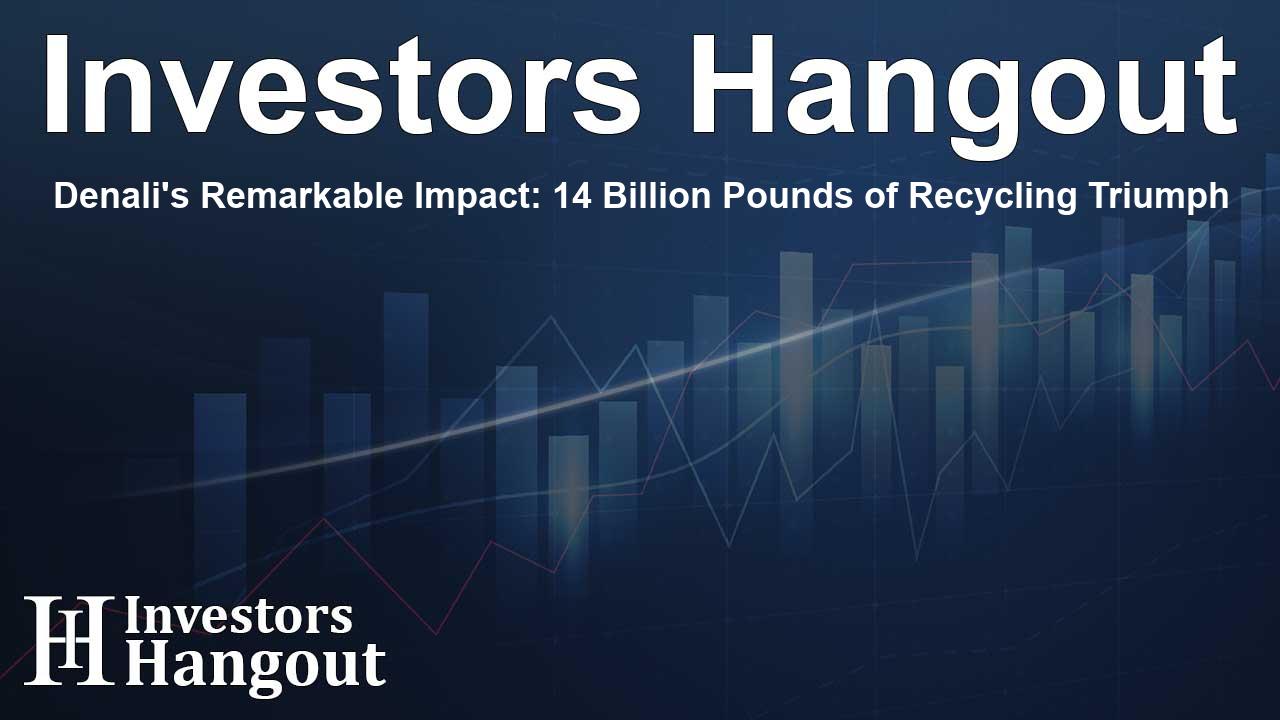Denali's Remarkable Impact: 14 Billion Pounds of Recycling Triumph

Denali's Massive Recycling Achievement
Denali, a leader in the organic recycling sector, has made headlines with its extraordinary accomplishment of recycling 14 billion pounds of organic materials and byproducts in just one year. This remarkable feat, outlined in its latest annual sustainability report, showcases Denali's dedication to advancing sustainability and combating food waste.
A Closer Look at Food Waste Recycling
A significant portion of this total includes an impressive 1.7 billion pounds of food waste that Denali successfully converted into valuable resources such as animal feed and compost. This achievement plays a critical role not only in reducing the volume of food waste entering landfills but also in contributing to the circular economy. According to estimates from the US EPA, this initiative has managed to avoid approximately 780,000 metric tons of carbon dioxide equivalent (CO2e) emissions. This impact is comparable to the emissions produced by over 185,641 gasoline-powered vehicles operating for an entire year.
Driving Change in Organic Waste Management
Denali's process involves collecting food waste from a diverse range of entities including grocery chains like Whole Foods Market and Albertson’s, alongside manufacturers, hotels, universities, and more across 48 states and Puerto Rico. This widespread collection network illustrates Denali’s role in transforming organic waste into valuable, usable products and its commitment to fostering a healthier planet.
Leadership Vision
Denali’s CEO, Todd Mathes, emphasizes the company’s mission: to replenish the Earth by repurposing waste. Over recent years, significant investments have reinforced Denali’s capability to fulfill this mission. With a dedicated team at the helm, Denali is not only addressing food waste but is also creating top-notch solutions for its partners and customers, thereby promoting a circular economy.
Addressing Surplus Food Challenges
Statistics indicate that the US generated around 89 million tons of surplus food in the last year. Consumer-facing businesses represent a major source, generating roughly 18 million tons, with retailers alone contributing about five million tons. Alarmingly, a significant share of this waste—51%—ends up in landfills. Denali's approach to unlocking the value of these organic materials not only highlights the importance of recycling but also aligns with national goals aimed at reducing food waste and ensuring sustainable practices in waste management.
Contributing to National Waste Reduction Goals
Denali’s strategy supports the national commitment to cut food loss and waste by 50% by 2030, facilitating cleaner and healthier communities. By effectively increasing the amount of food recycling, Denali is positioned as a vital player in realizing these objectives and promoting environmental sustainability.
About Denali
As the leading organic recycling company, Denali's mission is clear: to replenish the Earth by repurposing waste. Its operations significantly contribute to maintaining clean water, reducing landfill demands, enhancing soil fertility, and fostering resilience among farmers. Denali's expansive impact spans numerous acres and engages countless communities, playing a vital role in the food consumption cycle in the US.
Frequently Asked Questions
What is Denali's primary achievement mentioned in the article?
Denali successfully recycled 14 billion pounds of organic materials, including 1.7 billion pounds of food waste.
How does Denali convert food waste?
Denali converts food waste into valuable products such as animal feed and compost, helping to reduce waste and promote sustainability.
What is Denali's goal in relation to food waste?
Denali aims to significantly reduce food waste in the US and contribute to the circular economy.
What environmental impact did Denali's recycling efforts have?
The company’s efforts avoided approximately 780,000 metric tons of carbon dioxide equivalent emissions.
How widespread is Denali's operations?
Denali collects organic waste from thousands of grocery stores and various food manufacturers across 48 states and Puerto Rico.
About Investors Hangout
Investors Hangout is a leading online stock forum for financial discussion and learning, offering a wide range of free tools and resources. It draws in traders of all levels, who exchange market knowledge, investigate trading tactics, and keep an eye on industry developments in real time. Featuring financial articles, stock message boards, quotes, charts, company profiles, and live news updates. Through cooperative learning and a wealth of informational resources, it helps users from novices creating their first portfolios to experts honing their techniques. Join Investors Hangout today: https://investorshangout.com/
Disclaimer: The content of this article is solely for general informational purposes only; it does not represent legal, financial, or investment advice. Investors Hangout does not offer financial advice; the author is not a licensed financial advisor. Consult a qualified advisor before making any financial or investment decisions based on this article. The author's interpretation of publicly available data shapes the opinions presented here; as a result, they should not be taken as advice to purchase, sell, or hold any securities mentioned or any other investments. The author does not guarantee the accuracy, completeness, or timeliness of any material, providing it "as is." Information and market conditions may change; past performance is not indicative of future outcomes. If any of the material offered here is inaccurate, please contact us for corrections.